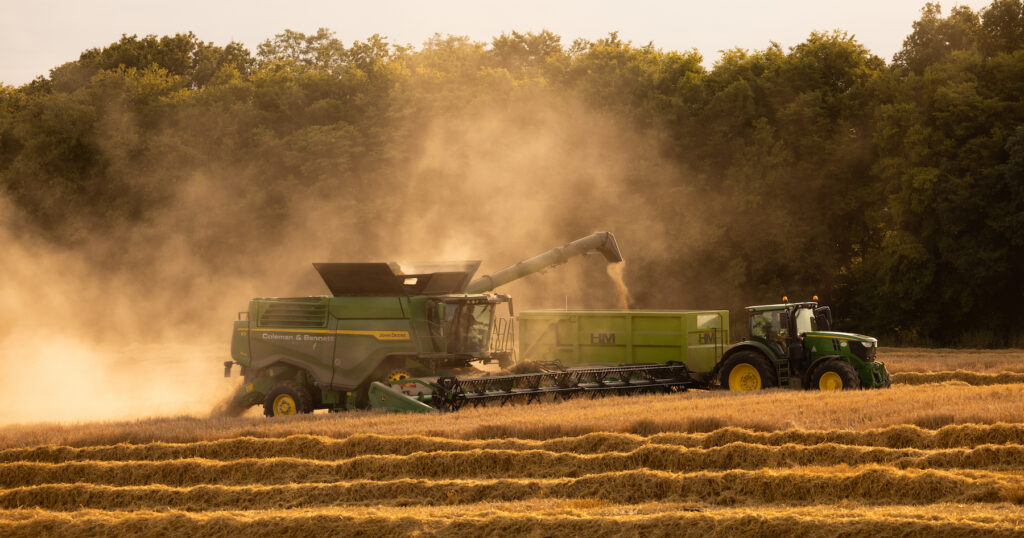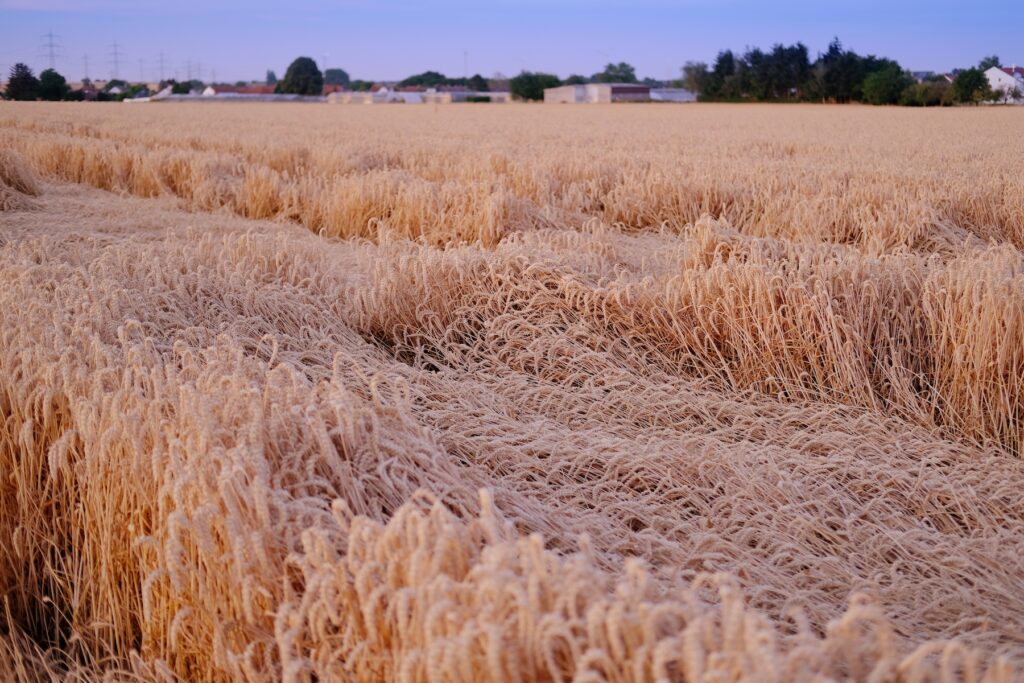Farmer anxiety mounts as volatile harvest weather threatens livelihoods
16th August 2023
Many farmers are worried for the future as unseasonal wet weather continues to hamper this year’s harvest. Farmers Guide caught up with Suffolk rural chaplain Graham Miles and farming charity FCN who offered advice for those who are struggling.

Stock photo for illustration only.
Sights of unharvested crops, flattened fields and emerging disease greeted Lightwave rural and agricultural chaplain Graham Miles on recent visits to Suffolk farms following weeks of unrelenting wet weather.
Seeing first-hand the damage caused to crops by persistent heavy rain, he is worried for the well-being of farmers who have already endured unprecedented challenges over the past year.
“It’s just one thing after another with farming at the moment.
“I’ve been out this morning, going towards Flatford and Dedham, and there’re still acres of standing crops there. A farmer was saying that having to do certain fields when he can and then go back to them, it’s just a total nightmare,” he told Farmers Guide.
“All this causes stress and anxiety, not just for them, but for their families as well, and the farm workers, so it’s a snowball effect.”
Rise in mental health calls
Mr Miles said he’s received an increased number of calls over the last few weeks from farmers in distress, some of whom have reported feelings of depression and even suicidal thoughts.
Although losses have been suffered right across the board, he noted smaller growers are taking the greatest hit as they rely on the harvest coming in to continue farming.
Many also depend on contractors to bring in the grain due to the high cost of machinery. However, if harvest is unable to proceed because of wet weather, it means lengthy delays for famers who have to wait for the next available slot to have the crops brought in.
According to the Met Office, last month has been provisionally the wettest July since 2009, with some parts of the country receiving twice as much rain as the yearly average. This stands in stark contrast to June, which has been the hottest on record in the UK.
For those struggling to cope in the midst of unforgiving weather and economic challenges, the chaplain’s advice is to reach out to charities such as Lightwave, FCN or YANA who are there to help.
“I can’t wave a magic wand, but the Lightwave rural and agricultural chaplaincy team is here for farmers, we can listen to them, they can offload onto us and we understand their problems. That’s what we’re there for, 24/7.”
“We can only control what we can control”
For Bruce Paterson, who runs Worstead Estate, a mixed arable and Wagyu beef farm, with his brothers Gavin and Alex, the conditions have been slightly challenging – but they have a suite of other crops and income besides cereals coming into the business.
They have also diversified out of agriculture too, and are looking to do more in this area to minimise the risks to the business.
While fertiliser prices are not as high as they have been, they are still higher than usual, the grain price is on the floor and rain is affecting the crop, Bruce said. Fortunately, the farm has not had a lot of crops that have lodged, and it’s been a fairly decent combine – but quite a few crops south of Norfolk are lodged, he said.
“We can’t control the weather, we can only control what we can control, and do the best we can. There will be people who will be struggling and hopefully the people who had a good year last year have kept some capital on the side that will help them sit through a tougher year.”
“That feeling that the nation is against you”
Alex Phillimore, head of communications and development at the Farming Community Network (FCN), said one impact of the recent conditions is farmers are having to spend more money to dry out crops – at a time when energy prices remain high.
Farmers have also been working into the early hours of the morning – and in some cases facing abuse from the public for working late. A since-deleted video recently did the rounds on social media, showing a farm worker being verbally abused by a member of the public for combining at midnight.
“I don’t blame the public for not necessarily understanding the ins and outs of farming because they have limited exposure to farming,” Alex said. “[But] you’re trying your best to harvest, ultimately to help feed the nation, and so that feeling that the nation is against you and the job that you’re doing is difficult, it puts a lot of stress on people
“It doesn’t help your mental health at all when you feel like the people you’re trying to help are against you.”
Working such incredibly long hours also creates other stresses, perhaps increasing the likelihood of an accident, being dehydrated and not eating well – all of which will have an impact too, Alex added. Plus profits will be down if the quality of the product is reduced due to high moisture levels.
“It reminds us all of the unpredictability and lack of control in farming, which has mental health implications.”
Climate concerns – a new normal?
As we see climate shifts there is a fear among some that this is the start of what could become the new normal. “We’re dealing with increasingly volatile weather that makes it harder to farm, and that in and of itself creates some anxiety for what’s in store for us. […]”
Alex added: “If we’re having to contend with more droughts, more floods, more of these kinds of extreme weather events, that is going to hit farmers where it hurts. And that impacts food security in the country further than just the farmer; it affects all of us if farmers are struggling to produce.”
The nature of cases presented to FCN’s helpline has become increasingly complex, he noted. “We’re dealing with people who are worried about the future, they’re in financial difficulty or they’ve got issues on the far around succession and the future direction of the farm.”
Top tips for looking after your mental health:
Whilst we can’t “wave a magic wand and solve everyone’s problems” as we’re dealing with factors beyond everyone’s control, Alex offers farmers the following guidance…
- Focus on the things you can control
“When we’re dealing with a lot of things that we can’t control, double down on the things that we can control. There are certain things in our lives that we can influence, so it’s about trying to prioritise the things that we can do something about.”
- Remember you are not alone
“We are part of a supportive community. Farmers in this country are all dealing with the same issue at the moment, whether it’s the weather in this instance or broader than that; the agricultural transition that we’re going through with the reduction in subsidies and moving over to a new system. As a farmer you are in the same boat as the rest of the farming community, and one thing that can do is actually remind us that we are not alone, even if it can feel like it because we’re working remotely. But actually, as an industry, we are all going through the same thing.”
- Stay hydrated
“It’s an obvious one, but take a lot of water out with you on the farm, because staying hydrated is super important for maintaining our cognitive function. When we’re operating heavy machinery, we can’t afford to make a mistake, it can be dangerous.”
- Avoid cutting corners
“You might think that cutting a corner will save you 10-15 seconds, but it’s better to do things right even if it’s a bit of a hassle. You know if you’re doing it right it’s going to be done safely and correctly, so do take that extra time to do things right. Farming is one of the big industries where we can’t be cutting corners because that can have potentially dangerous consequences. Farmers often put their livestock or product before their own wellbeing, so sometimes we do need to put ourselves first – it is the right thing to do, because if we’re always putting ourselves second, that can lead to burnout and other issues.”
- Ask for help before it is too late
“When farmers are going to be out on combines and it is tedious and repetitive and long and you might not be chatting with anyone, people can pick up the phone to FCN and talk to us.”We describe our service as a helpline, but we don’t want that to put people off. Through our helpline, you’re going to be talking to someone who is just there sometimes to have a friendly chat with you; they understand farming, they understand its pressures, they are there to talk. So if you just need to talk to someone, do pick up the phone to us, don’t wait until you’re at a point where everything’s gone really badly.”
Chaplain Graham Miles can be contacted any time by phone on 07413 683368 or via email at graham.miles.lightwave@gmail.com.
Contact FCN’s helpline on: 03000 111 999

